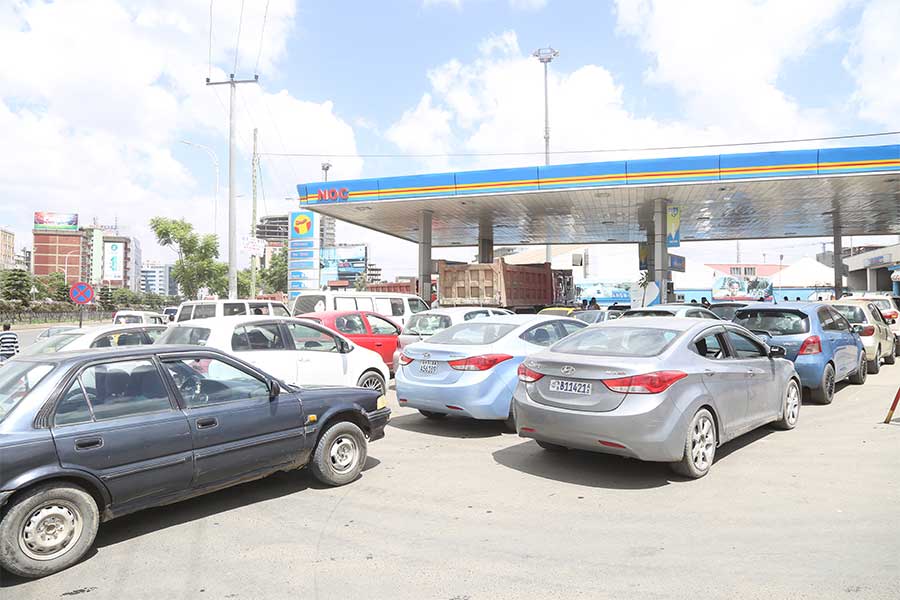
Agenda | Sep 14,2024
Jul 23 , 2022
By Abdulmenan M. Hamza
Ethiopia has experienced several episodes of international oil price shocks before but with much less volatility at the gas pump. The logic and timing of the recent massive increases in petroleum product prices are questionable, writes Abdulmenan Mohemmed (abham2010@yahoo.co.uk), a financial statement analyst with two decades of experience.
One of the woes affecting Ethiopia's economy is an oil price shock. Due to the Russian-Ukraine war, the price of crude oil soared to 140 dollars a barrel in March, the highest figure since mid-2008. With the fear of global recession, the price of crude oil has seen a downward trend, and it is currently trading at around 100 dollars a barrel.
The significant increase in global oil price occurs as the Birr has been depreciating. It is a double whammy. Global oil price increases combined with the fast depreciation of the Birr increase the import price of petroleum products substantially.
To address the oil price shocks, the government increased the pump prices of petroleum products three times in the past eight months, more than two-fold. In the most recent price review, some petroleum products increased by more than 30pc. The size of the latest increase has fed fears that it would exacerbate the inflationary situation and punish consumers.
In the past decade, Ethiopia has experienced several episodes of international oil price shocks but the petroleum products pricing strategy was much more sensible as the price adjustment was well managed. The recent massive increase in petroleum product prices, however, makes me question not only the logic of the rise but also the timing.
The global price of fuel is always volatile and highly susceptible to shocks. Over the past eight years, there were times when Ethiopia enjoyed cheap international fuel prices. From July 2015 to September 2016, for five consecutive quarters, the average price of Brent Crude Oil was 50 dollars or less a barrel. Similarly, for the whole of 2020, the average price of Brent Crude Oil was below 60 dollars a barrel, plummeting to as low as 29 dollars a barrel in the third quarter of 2019/20. There were also times when surging oil prices hit the economy. Before September 2014, the average price of Brent Crude Oil was more than 100 dollars a barrel for several quarters.
Despite such volatility, the increase or decrease in the pump prices of petroleum was smooth and gradual, save for a few occasions. This approach has significantly reduced the shock on the economy and consumers.
Apart from the occasional global oil price shock, much of the trouble has mainly come with the fast depreciation of the Birr in recent years. In the past four years, the currency has depreciated by nearly 100pc percent against a basket of currencies. The effect of the depreciation of the Birr on the import price of petroleum is severe.
It helps to go back in history to address the oil price shock of today. In 2001, the Petroleum Stabilisation Fund was created as a shock absorber. The Fund was designed to smooth out the prices of petroleum products in the domestic market. In times of downward movement in the global petroleum prices, the local prices are maintained, enabling the Fund to accumulate significant reserves. In times of unfavourable price movements in the international market, the reserves are used to subsidise the prices of petroleum products in the local market.
Although the design of the Stabilisation Fund appears sound, it has had practical drawbacks. In times of low international oil price volatility, it works fine. The trouble is when the global price of oil surges. The resources held by the Fund are consumed rapidly as the pump prices remain the same until the following price review. In this case, the government is forced to top up the Fund.
The other issue is that while the expectations of pump price increases encourage hoarding, the expectations of pump price reductions lead petrol stations to empty tanks, particularly when the price review date approaches. This causes supply disruptions across the country. A decade ago, inventory count used to be conducted at petrol stations before the price review date for refunds or additional charges. The system was abandoned as it was abused. The result is chaos a few days ahead of price review.
Petroleum supply and pricing are vulnerable to the global oil price shock, fast depreciation of the Birr and distributional issues. Addressing these problems requires innovative solutions. Using financial instruments such as crude oil derivates institutes predictability in the price of petroleum products. Significant automation in information processing enables to obtain the latest pricing data, leading to increased frequency of price review and smooth price development. This would deter the fast depletion of the Stabilisation Fund and helps reduce the supply disruption at petrol stations.
Involving the private sector in petroleum supply, as in Kenya and Tanzania, may increase options. Equally important is the savings arising from the recent drop in the global oil price, which should accrue to final consumers.
PUBLISHED ON
Jul 23,2022 [ VOL
23 , NO
1160]


Agenda | Sep 14,2024

Viewpoints | Aug 27,2022

Fortune News | Apr 03,2021

Sunday with Eden | Apr 17,2021

Radar | Feb 02,2019

Featured | Sep 07,2025

Viewpoints | Aug 12,2023

Editorial | Dec 05,2018

Radar | Feb 16,2019

Fortune News | May 08,2022

Photo Gallery | 180697 Views | May 06,2019

Photo Gallery | 170891 Views | Apr 26,2019

Photo Gallery | 161980 Views | Oct 06,2021

My Opinion | 137305 Views | Aug 14,2021

Dec 22 , 2024 . By TIZITA SHEWAFERAW
Charged with transforming colossal state-owned enterprises into modern and competitiv...

Aug 18 , 2024 . By AKSAH ITALO
Although predictable Yonas Zerihun's job in the ride-hailing service is not immune to...

Jul 28 , 2024 . By TIZITA SHEWAFERAW
Unhabitual, perhaps too many, Samuel Gebreyohannes, 38, used to occasionally enjoy a couple of beers at breakfast. However, he recently swit...

Jul 13 , 2024 . By AKSAH ITALO
Investors who rely on tractors, trucks, and field vehicles for commuting, transporting commodities, and f...

Nov 1 , 2025
The National Bank of Ethiopia (NBE) issued a statement two weeks ago that appeared to...

Oct 25 , 2025
The regulatory machinery is on overdrive. In only two years, no fewer than 35 new pro...

Oct 18 , 2025
The political establishment, notably the ruling party and its top brass, has become p...

Oct 11 , 2025
Ladislas Farago, a roving Associated Press (AP) correspondent, arrived in Ethiopia in...

Nov 2 , 2025
The National Bank of Ethiopia (NBE) has scrapped the credit-growth ceiling that had s...

Nov 2 , 2025 . By SURAFEL MULUGETA
The burgeoning data mining industry is struggling with mounting concerns following th...

Nov 2 , 2025 . By YITBAREK GETACHEW
Berhan Bank has chosen a different route in its pursuit of a new headquarters, opting for a transitional building instea...

Nov 2 , 2025 . By BEZAWIT HULUAGER
Nib International Bank S.C. has found itself at the epicentre of a severe governance...